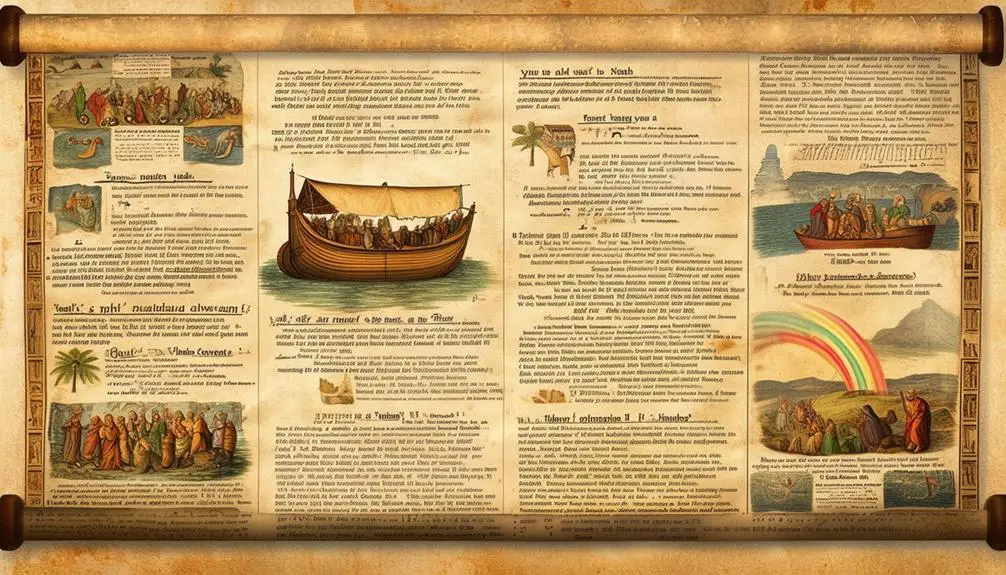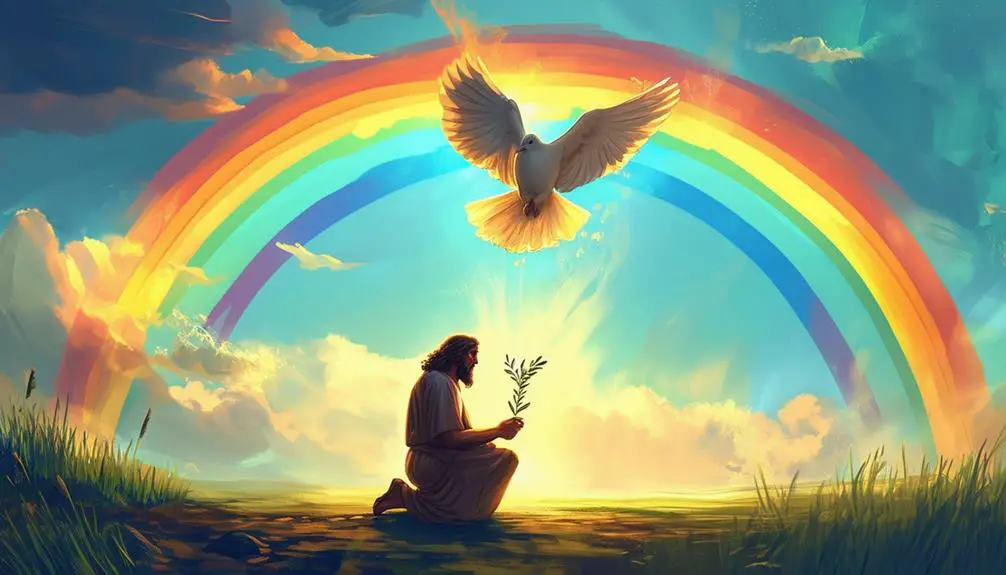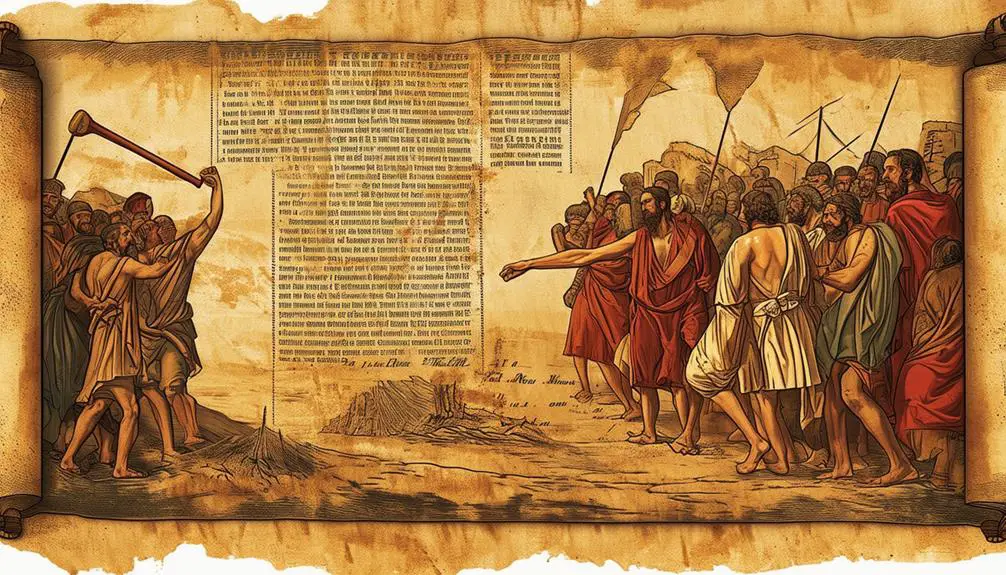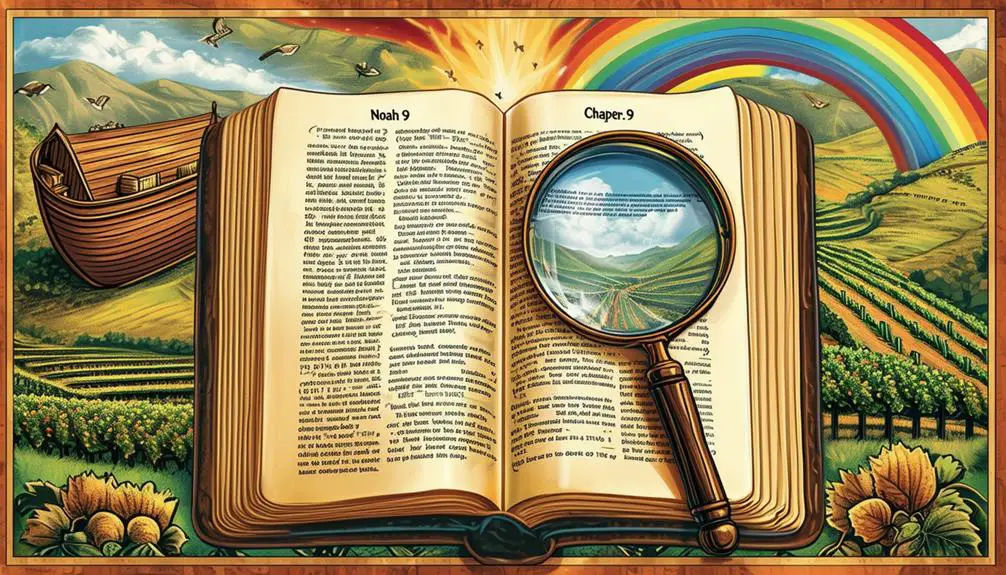Navigate Genesis Chapter 9, exploring Noah's covenant with God, the rainbow's symbolism, and the moral implications of Ham's transgressions.

Bible Study – The Book of Genesis – Chapter 9 – Summary and Analysis
Genesis 9 represents a pivotal shift in man's relationship with nature and divinity post-Great Flood. God imposes certain stipulations on Noah's lineage, emphasizing the sanctity of human life and humankind's new role in creation. The chapter unpacks God's everlasting covenant with Noah, symbolized by the rainbow, highlighting divine patience and protection. Dovetailing into Noah's intoxication and Ham's misstep, the narrative illuminates on moral repercussions. As you further explore, you'll unfold more about Noah's dynamic life, the implications of Ham's sin, and the enduring themes sewn throughout this chapter.
Key Takeaways
- Genesis 9 signifies a transformation in man's relationship with nature, imposing stipulations on Noah and his descendants.
- God establishes a covenant with Noah, promising never to destroy the earth with a flood again, marking a fresh start for humanity.
- The rainbow serves as a divine reminder of God's promise, forgiveness, and patience.
- Noah's vineyard and subsequent intoxication illustrate the potential for misuse and destructive indulgence in nature's gifts.
- Noah's curse on Ham's son Canaan, due to Ham's disrespect, leads to generational consequences, emphasizing the importance of familial conduct.
Contextual Background of Genesis 9

Diving into the contextual background of Genesis 9, you'll find it's a pivotal chapter in the biblical narrative that chronicles the aftermath of the Great Flood and Noah's covenant with God. Positioned strategically in the Genesis timeline, it offers a profound shift from the pre-flood world to a new era of human existence.
Genesis 9 bristles with Biblical symbolism. The emerging rainbow stands as a divine promise that such a cataclysmic deluge would not recur, while the dove with an olive branch has become a universal symbol of peace and reconciliation. The chapter's contextual backdrop echoes God's sovereign power and His irrevocable covenant with humanity.
You'll also discern the transformation of man's relationship with the natural world, a theme woven subtly throughout the narrative. The stipulations imposed on Noah and his descendants reflect an adjustment in mankind's dominion over the earth, post-flood.
In essence, Genesis 9 serves as a pivotal narrative, a bridge linking the antediluvian and postdiluvian periods. It's a chapter replete with lessons on divine mercy, judgment, and the responsibility of stewardship that God entrusts upon humanity.
Noah's Post-Flood Instructions
In the wake of the flood, God's instructions to Noah and his descendants, as detailed in Genesis 9, signal a significant shift in mankind's relationship with the rest of creation. These instructions, delivered with the same authority Noah had seen evident in the Ark's construction, emphasize Noah's leadership role and the new responsibilities it carries.
God's post-flood instructions to Noah encompass several key points:
- All animals, once feared, are now under human dominion.
- The sanctity of human life is reinforced, with murder expressly forbidden.
- Consumption of blood, seen as the life force, is prohibited.
- The earth, once destroyed, is to be replenished and inhabited.
- Noah and his descendants are to procreate and fill the earth.
This period in Genesis represents a formative moment in biblical history. Noah's leadership, as seen in the Ark's construction, is central to this new order. His obedience to God's commands, both in building the Ark and in his post-flood actions, is an example to his descendants. This obedience underpins the new relationship between man and creation, governed by the principles of respect, responsibility, and restraint.
God's Covenant With Noah

Following the post-flood instructions, one can't overlook God's profound promise to Noah – a covenant that would alter the course of human history. This agreement, detailed in Genesis Chapter 9, is a testament to Noah's obedience and faithfulness, a quality that marked him as a man of righteousness in an era of unprecedented wickedness.
The Divine promises weren't solely for Noah; they extended to his progeny and every living creature. God vowed never to destroy the world by flood again, a promise that was both universal and unconditional. It was predicated not on human behavior, but on God's mercy and forbearance.
You can observe that the covenant emphasized the sanctity of life. God prohibited murder and demanded respect for life, even that of animals. This was a radical departure from the violence that characterized the antediluvian world.
In essence, God's covenant with Noah established a new order, a fresh start for humanity marked by Divine promises and expectations. It underscored God's commitment to his creation, despite its flaws, and his desire for a just world, a testament to Noah's obedience and God's unending mercy.
Significance of the Rainbow
When considering the rainbow – a colorful and significant symbol in Genesis Chapter 9 – you'll discover that it's crucial to understand that it's more than just a beautiful natural phenomenon. Instead, it serves as a powerful symbol of God's covenant with Noah and all of creation. The rainbow represents a Divine guarantee, acting as a permanent reminder of God's commitment to never again destroy the earth by a flood.
In examining the symbolism of the rainbow, you'll observe that it signifies:
- A divine promise: The rainbow visually affirms God's covenant.
- Divine forgiveness: It symbolizes God's grace and mercy following judgment.
- Divine protection: It ensures God's protection over creation.
- Divine patience: The rainbow represents God's patience and longsuffering towards mankind.
- Divine presence: The rainbow's appearance after the storm indicates God's enduring presence.
Each color of the rainbow also holds symbolic significance in biblical interpretation, adding to its depth as a symbol. It's crucial to remember that the rainbow in Genesis transcends being a mere meteorological phenomenon; it embodies a profound symbol of God's lasting covenant with His creation.
Noah's Vineyard and Intoxication

Delving into another pivotal moment in Genesis Chapter 9, you'll find Noah's vineyard and his subsequent intoxication, a seemingly mundane event that actually bears significant theological implications. Noah, the survivor of the great flood, became a tiller of the ground and planted a vineyard.
This vineyard, as you'll see, isn't just about grapes and wine; it's laden with extensive symbolism. The vineyard symbolism represents mankind's ability to cultivate and harness nature's offerings, but it also signifies the potential for misuse and resultant devastation, as illustrated by Noah's intoxication.
Keyword |
Significance |
|---|---|
Vineyard symbolism |
Represents mankind's ability to harness nature, but also the potential for misuse |
Noah's intoxication |
Illustrates the devastating consequences of misuse |
Drunkenness consequences |
Unearths the destructive potential of unrestrained indulgence |
Noah's vineyard |
Sets the stage for mankind's struggle with temptation |
In his drunkenness, Noah loses his sense of dignity, revealing the disastrous consequences of excess. This event isn't just a cautionary tale about overindulgence. It's a profound lesson about the human predisposition towards temptation and the precarious balance between use and misuse. It serves as a stark reminder that every blessing can become a curse if not handled responsibly.
Ham's Sin and the Curse
In the wake of Noah's indiscretion, we're confronted with Ham's sin and the resultant curse, a disturbing episode that underscores the dire consequences of disrespect and irreverence. Ham's motivation in this scenario is perplexing and complex, possibly driven by a desire for power or perhaps a deep-seated resentment.
Scholars have long debated the nature of Ham's transgression. Many assert he gazed upon his father's nakedness and did nothing to cover it, an act of profound disrespect in ancient Near Eastern culture. Others suggest more severe misconduct.
Nonetheless, it is the sin consequences that resonate most profoundly. These include:
- A curse laid upon Canaan, Ham's son, rather than Ham himself
- The enslavement of Canaan's descendants
- The clear delineation of proper familial conduct
- The emphasis on the importance of respect and reverence
- The implication that sin consequences can extend to future generations
Through this episode, the narrative demonstrates that actions have significant repercussions, both immediate and far-reaching. It highlights the importance of respect, especially within the family unit, and it underscores the weighty impact of personal choices. Ham's sin and the curse serve as a stark reminder of these truths.
Implications of Canaan's Curse

As we examine Genesis Chapter 9, the implications of Canaan's curse emerge as a critical point of focus. You'll grapple with the understanding of this curse, its origins, and the profound impact it has on Canaan's descendants. This exploration will require an analytical approach, as the narrative complexities and theological implications are deeply rooted within the text.
Understanding Canaan's Curse
You might find it particularly intriguing to explore the implications of Canaan's curse, a narrative that carries significant weight in the ninth chapter of Genesis. As you investigate further, you'll discover that the origin of the curse holds a profound story about Canaan's fate.
- The curse was pronounced by Noah, Canaan's grandfather.
- It was a reaction to Ham's disrespect towards Noah.
- Canaan, son of Ham, was to bear the curse instead of his father.
- The curse, 'a servant of servants shall he be,' suggests a life of servitude.
- This curse was directed not only to Canaan but also to his descendants.
This understanding of Canaan's curse can shed light on the dynamics of relationships, respect, and consequences in biblical times.
Curse Impact on Descendants
Delving deeper into the narrative, it's clear that the curse's ramifications didn't just affect Canaan, but also had a profound impact on his descendants. The Familial Consequences were far-reaching, casting a long shadow over the Cursed Generations that followed.
To better understand, let's examine this in a simple table format:
Cursed Generation |
Familial Consequence |
Implication |
|---|---|---|
1st Generation |
Canaan |
Immediate curse and humiliation |
2nd Generation |
Canaan's children |
Inherited the curse, societal humiliation |
3rd Generation |
Canaan's grandchildren |
Continued societal humiliation, displacement |
4th Generation |
Canaan's great-grandchildren |
Continued displacement, struggle for identity |
The curse not only marked Canaan but also defined the trajectory for his progeny, transforming a personal humiliation into a generational struggle. Interpretation of this curse has fueled many societal and theological debates over the centuries.
Death of Noah: An Overview
In Genesis, you encounter the death of Noah, a significant figure whose legacy is woven into the fabric of biblical history. You'll examine the intricate details surrounding his demise, enabling a thorough understanding of its implications. This journey will further your grasp on the intricate tapestry of events and characters that Genesis presents, specifically focusing on Noah and his end.
Noah's Legacy
Reflecting on Noah's legacy, it's important to explore the particular circumstances surrounding his death, a pivotal event in the Genesis narrative. Noah's faithfulness is central to his legacy. He's depicted as a steadfast man, unwavering in his loyalty to God. Despite the corruption around him, Noah remained faithful, embodying integrity and righteousness.
Family dynamics also played a significant role in his life, shaping not only his character but also his legacy. Noah's family was his refuge, his fortress in the midst of chaos. His relationships with his sons, Shem, Ham, and Japheth, revealed his compassionate yet stern nature.
Consider the following:
- Noah's unwavering faith
- His family as his fortress
- The relationship dynamics with his sons
- Noah's role as a patriarch
- The moral lessons from his life
These elements encapsulate Noah's legacy, a tribute to his life of faith and familial devotion.
Details of Demise
Moving towards the end of Noah's life, you'll find that his passing, much like his life, offers profound insights into his character and the broader biblical narrative. His death, occurring at the ripe age of 950, symbolizes a change in the End Times Prophecy, marking the conclusion of the antediluvian age. It's not just a chronological marker, but a spiritual one, indicating a shift in Divine Judgment. Noah's demise is silent and peaceful, a stark contrast to the tumultuous events of his life, including the Great Flood. This silence can be viewed as a divine reward for his righteousness and obedience. Noah's death is as significant as his life, shaping the narrative of Genesis and reflecting the complexity of biblical themes.
Thematic Analysis of Genesis 9

Delving into the thematic analysis of Genesis Chapter 9, you'll find that it's a cornerstone of Biblical narrative, rich with symbolisms and profound implications. The chapter explores Divine Promise and carries significant prophetic implications.
The key themes that you'll encounter in this chapter include:
- *The Covenant*: God's divine promise to Noah and his descendants marks a turning point in the biblical narrative. It exemplifies God's mercy and faithfulness, promising never to destroy the earth by flood again.
- *The Rainbow*: This serves as a physical sign of the covenant, a constant reminder of God's pledge to mankind.
- *Noah's Prophecy*: The prophetic implications of Noah's declarations over his sons shape the narrative of the Bible, influencing the destinies of their descendants.
- *The Concept of Human Responsibility*: Genesis 9 posits that human actions have consequences, as seen in Noah's reaction to Ham's disrespect.
- *The Sanctity of Life*: The chapter reinforces the value God places on life, prohibiting murder and demanding respect for all life.
Frequently Asked Questions
What Other Books of the Bible Reference Events From Genesis 9?
You're asking about references to Genesis 9 in other Bible books. It's fascinating how Genesis 9 prophecies and the Rainbow Covenant interpretation are echoed throughout scripture. For instance, Isaiah 54:9 references the Noahic Covenant. Likewise, Ezekiel 1:28 mentions the rainbow, symbolizing God's promise. Studying these cross-references can deepen your understanding of biblical themes and promises.
How Does Genesis 9 Compare to Other Cultural Flood Narratives?
When you compare Genesis 9 to other cultural flood narratives, you'll find some striking similarities and interesting differences. Many flood mythologies share a universal deluge and a chosen family's survival. However, the particulars vary. Genesis 9, for instance, emphasizes God's covenant and rainbow sign. Through a comparative analysis, you'll gain a deeper understanding of the common threads and unique elements that make each cultural narrative distinct.
What Is the Significance of Noahs Vineyard in Other Religious Texts?
Imagine you're reading an ancient text, where Noah's vineyard's often depicted as a symbol of abundance and divine blessing. Its significance extends beyond Christian tradition, such as in Islamic texts, where Noah's sobriety and vineyard management is revered. This vineyard symbolism serves as a metaphor for spiritual growth and divine providence. It's fascinating to study how different faiths interpret these biblical narratives, isn't it?
How Do Different Christian Denominations Interpret Hams Sin and the Curse?
Different Christian denominations interpret Ham's sin and the associated curse in varied ways. Some see it as a serious moral transgression warranting divine punishment, others view it as a test of Ham's repentance. The curse interpretations also differ; it's seen as either direct punishment or a prophecy of future hardship. You'll find diverse perspectives among denominations, reflecting their unique theological stances.
Are There Archaeological Evidences Supporting the Events Described in Genesis 9?
You're asking about archaeological evidence for Genesis 9. While Flood Geology suggests global effects of Noah's Flood, it's controversial in mainstream science. As for Noah's Artifact, it's mostly speculative, but some people believe in the existence of Noah's Ark's remnants. However, there's no definitive, universally accepted archaeological proof. It's a matter of personal belief and interpretation of available data. Remember, faith often transcends what's empirically provable.



Sign up